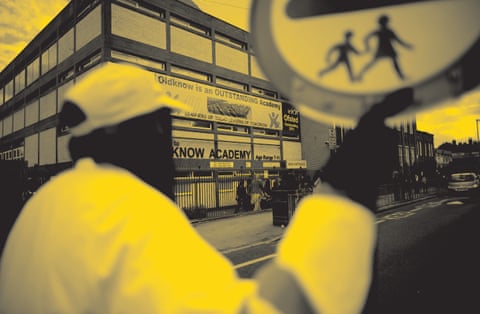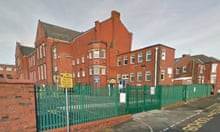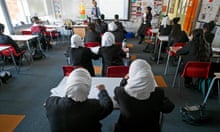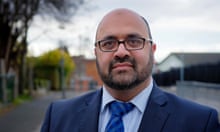In November 2013, Birmingham city council received a strange document in the post. It was a photocopy of a letter, which seemed to be part of a correspondence between Muslims conspiring to take over local schools and run them according to strict Islamic principles. The photocopy was accompanied by a note from an anonymous person claiming that they had found these pages in their boss’s office.
The letter – supposedly written by an Islamist offering advice to a co-conspirator – outlined a five-stage strategy called “Operation Trojan Horse”. Step one: identify vulnerable schools where most of the pupils are Muslim. Next, identify a group of sympathetic parents to agitate for an Islamic agenda. Then put in place governors who adhere to the same conservative Islamic beliefs. Next, identify staff to disrupt the school from within by changing rules and undermining unsympathetic colleagues. Finally, run anonymous letter and PR campaigns with the aim of forcing the headteacher to resign. The letter stated that this strategy “is tried and tested within Birmingham”, and named specific schools where it had supposedly been carried out.
In December, the council passed the letter to the Home Office and the Department for Education (DfE). In early 2014, the documents were leaked to the media. Headlines began to appear alleging that a number of schools in predominantly Muslim areas of Birmingham had been imposing hardline religious teachings and fomenting extremism.
The “Trojan horse” letter itself was quickly discredited as a fake, but the allegations it contained took on a life of their own. “Revealed: Islamist plot dubbed ‘Trojan Horse’ to replace teachers in Birmingham schools with radicals”, said one Daily Mail article a few weeks after the story broke. “Council leader calls for fightback on ‘schools jihad plot’”, said the Birmingham Mail not long after.
In response to the allegations, Ofsted carried out emergency investigations in 21 schools in Birmingham. Of these, five were judged to be inadequate – despite some previously being rated as outstanding – and placed in special measures, the lowest possible rating. Inspectors alleged that these schools had provided inadequate sex education, failed to teach students enough about belief systems other than Islam, segregated some classes according to gender, and discouraged boys and girls from socialising with each other. In some cases, it was claimed, staff who disagreed with these changes had been bullied and harassed. When the Spectator ran an article about the case not long afterwards, the cover illustration showed a child with a Qur’an in one hand and a sword in the other, under the words “Taught to hate”.
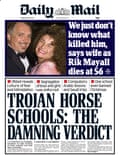
Every day, as the story developed, journalists jostled outside the schools involved. They roamed the local area, asking random passersby – “anyone who looked Muslim”, said one resident – for their opinion on extremism in Birmingham’s schools. By the time exam season arrived, students found themselves having to push past reporters to take their GCSEs.
Over that summer, the scandal escalated once again when the then education secretary, Michael Gove, publicly criticised the approach of the Home Office – then run by Theresa May – to tackling non-violent extremism. The infighting between Gove and May continued for weeks. One of May’s top advisers was sacked. The allegations dominated the news for months, triggering hundreds of headlines, hours of news broadcasts, and at least four major government investigations.
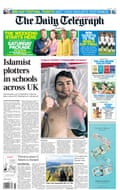
Three years on, the Trojan horse affair remains perhaps the best known and most polarising story about Britain’s relationship with its Muslim citizens. For many, the story has come to symbolise the failures of multiculturalism and the threat that hardline Islamic ideology poses to the future of the country. It was mentioned in the 2017 Ukip manifesto, and it is rare for a month to go by without some reference to the scandal in the rightwing press. (Several reports this year in the Telegraph and the Times have warned of a “new Trojan horse plot” in different parts of Britain.) For others, it is a confected scandal promoted by rightwing newspapers, the product of a climate in which all British Muslims are viewed with suspicion, and complex questions about faith and integration are reduced by politicians and the media to hysterical debates about terrorism.
Despite numerous government reports, parliamentary hearings, and a bewildering array of legal processes, the truth has been hard to pin down. The implicated teachers and governors have always denied that there was any conspiracy to “Islamise” the schools, arguing that their intention was to increase community engagement and raise attainment among disadvantaged Muslim children. But even observers who are sympathetic to these claims seem to agree that something did go wrong in the administration of the schools involved in the scandal. And after successive investigators found no evidence for the claim that students were being radicalised, public perception that there was a sinister Islamist plot still persists. What really happened?
One striking aspect of the Trojan horse affair is that both sides largely agree on the basic facts. No one disputes that there was a concerted effort to recruit Muslim staff and governors across schools in east Birmingham, nor that prayer rooms and, in some cases, calls to prayer were introduced, and that there was a focus on core subjects such as English and maths, at the expense of drama and music. With the exception of a few incidents which come down to one person’s word against another, what is in question is not what happened, but how what happened should be interpreted.
In the media, the term “Trojan horse” quickly became shorthand for a broad, often vague, range of anxieties about Muslims gaining undue influence in Birmingham’s schools. More than 20 schools fell under suspicion, but over time, the allegations came to focus on the five schools that were downgraded by Ofsted in its snap inspections. These were the secondary schools Park View, Golden Hillock and Saltley, and primary schools Oldknow and Nansen.
All five were located within four miles of each other, in a part of east Birmingham where almost 80% of residents are Muslim. The neighbourhoods – Washwood Heath, Small Heath, Sparkhill and Alum Rock – are some of the most deprived in Britain. Gang crime is common, and extremist groups sometimes try to recruit there. Many children at Park View and Nansen grow up in poverty, with all the associated problems – overcrowded homes, poor nutrition, chronic stress. “Nothing good is happening outside, nothing good,” says Henna Rashid, a former teaching assistant at Oldknow primary school.
Razwan Faraz, who was deputy head at Nansen when the scandal hit, grew up in Sparkhill in the 1990s. His parents, who emigrated from Pakistan in the 1970s, worked hard – his dad had two jobs – often leaving Faraz and his two brothers to their own devices, playing in a nearby derelict bingo hall. They went to the local secondary, Golden Hillock, where the proportion of children achieving A*-C grades in their GCSE exams was routinely below 10%. “I didn’t feel it was an adequate education I received,” Faraz said. “It was almost like, ‘If they’re quiet and behaving, that’s as much as we can expect.’”
For Faraz, there was no continuity between home and school. Almost all the students were from Pakistani families, but almost all the staff were white. He felt as if he was living a parallel life. As a young teenager, he got involved in gangs, hanging out on the street, dabbling in petty crime. But after his dad told him he would be sent to Pakistan if he did not change his ways, he began to gravitate towards a group of conservative religious boys. They hung out, prayed together and remained friends for a few years. Despite not applying himself, Faraz passed his GCSEs and went to sixth-form college.
At university in Birmingham, he felt out of place. “I couldn’t converse with anybody who wasn’t from the Pakistani community,” he said. Like many others in the area, he married young, at 18, but it was an unhappy union, which collapsed by the time he graduated at 21. He questioned his religious convictions, and turned to Sufism, the mystical strain of Islam. “Sufi culture really appealed to me – the idea of going into yourself and discovering your own strengths,” he said. In 2004 he decided to apply for an administrative role at a local educational charity, the Al-Hijrah Trust. Here, he came into contact with a man named Tahir Alam. At the time, Faraz had no idea that this encounter would change his life.
For more than two decades, Alam has been a towering figure in the world of Birmingham education. He is an imposing presence: a large, well-spoken man with unwavering confidence who, over his years as a governor, schools inspector and adviser to the council has occasionally rubbed people up the wrong way. “He is an assertive person, a capable person,” says Dr Marius Felderhof, a theology professor at the University of Birmingham, who worked with Alam on the city’s religious education syllabus. “I thought of him as a rational person, committed to improving the education of Pakistani boys in particular, because he thought the Pakistani community was being disadvantaged.”
In 1997, Alam became a governor at his alma mater, Park View, which locals sarcastically referred to as “Park View Grammar”. That year, only 4% of students attained A*-C grades at GCSE. Alam recalls a conversation from that time with a councillor about how to raise standards at the school. The councillor told him he would need to ship in students from other areas – meaning whiter, more affluent areas. Overhauling this culture of low expectations became Alam’s focus. “We focused on the big things, like academic progress, monitoring, employment of good staff,” Alam told me.
Not long after Alam became a governor, Park View applied for permission to make the school’s daily assembly Islamic in nature – this meant that they would contain moral lessons based on an Islamic framework. There was nothing particularly unusual about this: every school in Britain is legally required to provide a collective act of daily worship (although, in practice, many ignore it). According to the legislation, this should be “wholly or broadly Christian in nature” unless permission is granted to change the designation.
Despite opposition from some staff members, the governors pushed ahead with the decision to give Islamic assemblies. Alam believes schools should not “try to save Muslim children from Islam”, and that incorporating their home culture into their school lives not only helps behaviour, but improves educational attainment. Little research has been done on this in Britain, but educationalists in the US have studied similar approaches with black and Latino children, finding that when school celebrates children’s identity, results tend to improve.
In 2001, Alam, who was chief governor, hired a new headteacher, Lindsey Clark, who was not Muslim. Together, they hired new staff and worked to improve data collection and monitoring – keeping track of each student’s results to ensure they were improving. Within a year, the percentage of students getting A*-C went up to 11%. By 2003 it was 18%, by 2005 it was 27%, and in 2006 it hit 41%. The critics grew quieter.
For Faraz, meeting Alam was a turning point. He had long felt as if he didn’t belong anywhere, and now, suddenly, he had a role model. “Meeting him made me realise, ‘Hang on, I’ve got something to contribute to society.’ He was like, ‘Come on, what are you doing with your life?’” Over the next few years, Faraz discovered his passion for education, progressing from his administrative role to meeting headteachers around the country to promote teacher training.
In 2005, Faraz joined the governing body at his old school, Golden Hillock, where he felt standards were as low as ever. “I didn’t see any change, 10, 15 years on,” he says. Once, when Faraz was reviewing the work experience placements for year 10 students, he noticed that they were mostly in high-street shops and restaurants. He asked the other governors why none of the kids were going to law firms. A white governor told him that although parents might want their kids to become lawyers or doctors, the reality was they were going to work in the service or retail sectors, and should be prepared. “I thought, ‘This is not right at all, if this is the expectation,’” Faraz says. Along with other governors, he began to push for changes. In 2008, Faraz started training as a teacher, working as a trainee at Park View.
Throughout the 2000s, Alam worked with Birmingham city council to increase diversity on school governing bodies. At a grassroots level, too, teachers, governors and school administrators in east Birmingham were encouraging more Muslims to train as teachers. “There was some emphasis on Muslims going into teaching,” said Mazhar Hussain, who taught at Park View from 2004-2012 and later at Golden Hillock. “I didn’t see anything wrong with that. I just thought, ‘Fine, as a community, they’re getting involved to improve education.’”
Local communities taking ownership over their schools was once an uncontroversial idea. Under Tony Blair, it was a policy Labour championed. But in sharply segregated areas, it can raise difficult questions over who has the final say when what the community wants from their school deviates from prevailing national norms. The question of how far the wishes of culturally conservative minorities should be accommodated strikes at the heart of debates about multiculturalism. “We knew we needed to recruit more Muslim parents, but there’s a question about balancing,” said one non-Muslim governor, who wished to remain anonymous, at a school in Birmingham which was not involved in the Trojan horse affair. “What do you do after they’ve come on board if they’re religious nutjobs?”
One of the first people to raise concerns about the growing influence of Islam in schools in Birmingham was Tim Boyes, a former headteacher, who is now chief executive of the Birmingham Education Partnership, a non-profit company established in 2013 to improve schools. Boyes started teaching in Birmingham in 1987, and has spent most of his career in schools where the majority of students have Pakistani heritage. He recalls instances as far back as the early 1990s when parents clashed with teachers over issues such as hymns being sung in assembly, or teachers keeping wine in the staffroom. “Folk in a leadership position [in Birmingham] have not always known well how to respond to a culturally unfamiliar set of behaviours,” he told me.

These tensions rumbled on in the background alongside the push for greater civic engagement in schools. “Alam caused me concern over many years,” says Boyes. “He was very deliberately and strategically looking for people to be embedded in the education system.” While Boyes felt that part of Alam’s mission was “hostility to the establishment”, Alam characterises himself as an educational insider. “It was government policy that there should be an increase of ethnic representation,” Alam says. “This was something local authorities were measured and inspected against. There was nothing clandestine about it.” In 2007, Alam was invited to Downing Street to meet Blair, in recognition of his work on diversity.
Faraz, meanwhile, finished his teacher training in 2009 and moved to Adderley primary school to take up the position of assistant head. At the time, his personal life was strained, partly because of his difficult relationship with his brother, Ahmed. While Faraz was Sufi, Ahmed was Salafi – an orthodox Sunni sect that advocates a return to the practices of early Islam. Ahmed ran a bookshop in Birmingham, which was raided in 2007 and 2010 under the Prevention of Terrorism Act because of the inflammatory literature on its shelves. In 2011, he was convicted of spreading terrorist propaganda. “Because of his line of thinking, I didn’t really have a relationship with him,” Faraz said. Nonetheless, after the conviction, Faraz appeared on a local BBC news broadcast defending his brother’s right to free speech. Later, when the scandal broke, Faraz was often identified in the media as the “brother of a convicted terrorist”. No mention was made of the conflict between them.
During this period, results at Park View were steadily improving. In 2011, students achieved their highest-ever grades: 73% A*-C. For an inner-city school in one of the UK’s most deprived areas, this was outstanding. Park View is not a large school; it accepts less than 600 pupils aged 11-16. It was heavily oversubscribed, so its catchment area was just a few streets. Many families who lived there were not just Pakistani, but originated from the same few villages.
When Laura (not her real name) started at Park View as a teacher in 2009, she was taken aback by how well behaved the children were. “Kids were expected to get the grades and go to college. That was powerful,” she said. “Kids and parents really respected the fact they were at that school.”
The religious activities of Park View have been the focus for the media, lawyers and government investigators, but it was no seminary. “I really enjoyed my time at Park View,” said Alia (not her real name), a former student who left in 2014 to go to sixth-form college. “I have the impression that our school was unusual, because of the enthusiasm of the teachers and the fact that they really wanted us to succeed. Our teachers went above and beyond.” She recalls extra-curricular activities such as mock trials and debates, and a visit to Warwick University. There was even an X-Factor-style music competition.
Religion came into the school day at numerous points. There were assemblies that used Islamic texts and traditions to address broad themes, such as kindness and respect. A prayer room was available, and posters around school listed the times for Friday prayers. (These posters were later cited in various news reports as evidence of pressure on children to pray.) While teachers and students say that Friday prayers were optional, some claim it wasn’t always an entirely free choice. “I went to an assembly once where they made anyone that didn’t go to Friday prayers stand up and lambasted them in front of everyone,” Laura said. During her three years there, she says that more and more students attended Friday prayers.
Despite having reservations about the role that religion played at Park View, both Laura and another teacher I spoke to, Mike (not his real name), believed that it contributed to the sense of community. “They had a really clear ethos and everyone was on board,” said Laura. “The religion helped to build some of that.” One year, she remembers, students and teachers fasted before the year 11 pupils broke for study leave ahead of GCSEs – a religious practice to bring good luck. Staff and students broke their fast together, and Laura describes it as a happy coming-together of the school community. This was later cited in the media as an example of excessive religiosity. (“Year 11 pupils about to sit their GCSEs at the supposedly secular school were asked to go on an Islamic fast to put them in the right ‘spiritual frame of mind’ for exams”, said a Telegraph story in May 2014.)
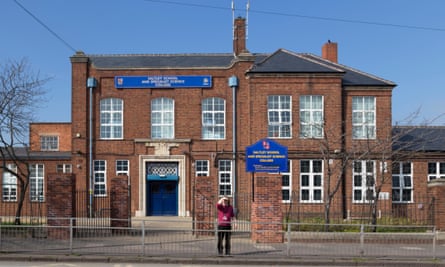
Although Park View was co-educational, boys and girls were segregated for certain subjects, including PE and sex education, which is not uncommon. One particular sex education lesson that took place in 2010 would later become a cornerstone of the case against the school, appearing in the news and government reports. In this class, teachers presented PowerPoint slides that focused on marital life but skirted around the subject of sex. During a Q&A session that followed, one student said that he had been told in the mosque that women couldn’t refuse sex within marriage. The teachers were accused of agreeing with this. When I asked one of the teachers involved in the class, Mazhar Hussain, about this, he gave a long explanation about where in Islamic scripture this originated, and how his grandparents’ generation might have believed it. “I did not go into all that,” he told me. “I said it’s not something people believe now.”
Exactly what was said in this class is one of the few points in the affair where the facts are contested. But everyone agrees that some boys came away with the impression that according to Islamic law, a woman cannot say no to sex with her husband. One male student, troubled by the lesson, asked Laura if this was correct; she was horrified. In the following days, teachers say that some boys taunted girls, saying: “You can’t refuse sex when you’re married”. When this was brought to the attention of the two assistant headmasters – Monzoor Hussain, who is Mazhar’s older brother, and Arshad Hussain (no relation) – they called an assembly to explain that marital rape is legally and morally wrong. Everyone I spoke to confirmed that this assembly took place.
Around the same time, Boyes was gathering together a dossier with his concerns about Islamisation in schools in Birmingham, and what he saw as the mounting pressure on headteachers from conservative Muslim parents. In 2010, he gave a three-hour presentation to then schools minister Jonathan Hill. “I was saying, ‘You don’t understand how dangerous the language of benign Anglicanism is when it’s in the hands of Salafists from a Pakistani or Yemeni background,’” Boyes told me. “You don’t understand how problematic it is when schools think they can do their own thing and communities can run their own schools.”
Yet when Ofsted inspected Park View in 2012, it became the first school to be ranked “outstanding” under tough guidelines introduced by new chief inspector Michael Wilshaw. Ofsted singled out its excellent provision for social, moral and religious care. “You can sense a good school as soon as you walk in,” said Wilshaw when he visited to observe a lesson after the top rating came out. Lindsey Clark, the headteacher who had overseen the school’s transformation between 2001 and 2012, was given an OBE. The Independent and other newspapers published gushing profiles of the school. “It was amazing,” said Muneeza (not her real name), a year-10 student at the time. “The stereotype about Alum Rock is that the boys become taxi drivers and the girls get pregnant, but we were showing that we were more than that.”
Park View’s success stood out in part because other local schools were doing so badly. On 28 August 2012, the year after Park View celebrated its best-ever GCSE results, 50 parents and students gathered outside Golden Hillock, three miles south of Park View, to protest against poor results. Headteacher Matthew Scarrott blamed harsh new marking criteria. Tension had been building between governors and senior leadership, and Scarrott later said that governors had mobilised parents to push him out. (Faraz was still on the board of governors at this point, but says he was only aware of the protests afterwards, and that the governors who had been involved were reprimanded.) In March 2013, Scarrott resigned.
Soon after the glowing Ofsted report, Park View became an academy. While normal state schools are run by the local council, academies operate as charitable trusts – in this case, the Park View Educational Trust, headed up by Alam – with greater autonomy over pay and curricula. Introduced by Labour in 2000, this model was massively expanded by the Conservative-Lib Dem coalition. In May 2010, when the coalition took power, there were 203 academies in England; by November 2013, there were 3,444.
While the education secretary, Michael Gove, celebrated the notion of schools being “freed” from the meddling of local government, the rapid expansion of the academies programme meant that ultimate responsibility for thousands of schools suddenly shifted from local authorities to the DfE. Previously, if a parent or teacher wanted to complain about governors, they could go to the local council; with academies, they’d have to go to national government.
At the same time, the coalition’s austerity policies were shrinking local authority budgets, which meant oversight for non-academy schools was drastically reduced. Birmingham city council had £650m cut from its budget between 2010 and 2016. “It’s soul-destroying,” said Brigid Jones, Labour councillor for Selly Oak, in south-west Birmingham. In 2010, the school improvement division, responsible for oversight of schools, had more than 100 officers. In 2012, when Jones took over as cabinet member for children, families and schools, the number had been cut to 16. It was later cut to just eight officers, who were expected to oversee around 400 schools.
Under the academies programme, the government actively encourages successful schools to incorporate failing ones into their educational trusts and oversee their management. One such school was Nansen Primary, the feeder school for Park View. In May 2012, Faraz began working at Nansen as deputy head, and with other senior leaders, he focused on trying to improve results. “He had broad horizons, he wasn’t talking purely about Muslim things,” said John (not his real name), who taught at Nansen during this period. “We had some interesting discussions around integration and the issue of the school having students from a single demographic. He suggested it would be a good idea to do sports days with schools with white and black Caribbean children.”
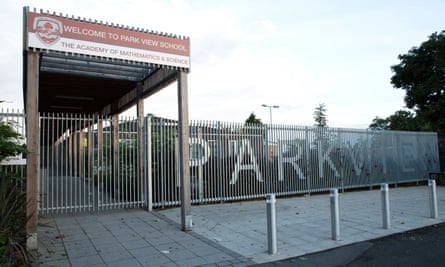
In October 2012, Nansen converted to academy status and became part of the Park View Educational Trust. As an academy, decisions about staffing and curriculum at Nansen would be made by the Park View Trust’s senior leadership team, which was composed of a mixture of Muslims and non-Muslims: Tahir Alam, Monzoor Hussain, Hardeep Saini (who is Sikh) and Lindsey Clark (also non-Muslim). Just six months after being established, Park View Educational Trust was running two schools: Park View and Nansen. In October 2013, a third school, Golden Hillock, was incorporated into the Trust.
With three schools to oversee, Faraz and other staff at the schools felt that the management team behind the Trust was overstretched. “Lindsey, the headteacher, took a step back,” said Laura, the Park View teacher. “She started being an executive head and going to other schools and wasn’t at our school as much. Monzoor Hussain started to take over a bit more.”
Former colleagues describe Monzoor Hussain, who became acting head of Park View in 2013, as friendly and charismatic. That year, he set up a Whatsapp group for male Muslim employees of the three schools run by the Trust to keep in touch. It was called the Park View Brotherhood. A similar group existed for female Muslim members of staff, the Park View Sisterhood. These WhatsApp groups would, like the sex education lesson, go on to be one of the central sources of controversy in the Trojan horse affair.
Among thousands of mundane messages about school events and news articles were some worrying comments, which were later leaked to the press. At one stage, teachers discussed how to stamp out flirtatious behaviour among students. After someone shared a news story about gay men in Pakistan using Sufi shrines as pickup points, Faraz described them as “animals”, adding: “As teachers we must be aware of combatting their satanic ways.”
Faraz was also a member of another WhatsApp group, called Educational Activists, which included different people from the Birmingham school system. In 2014, messages were exchanged celebrating the appointment of a female Muslim headteacher at a local school. “Please don’t pressurise her to start the Islamising agenda first – that will be a lot easier when she is respected as a leader,” Faraz wrote. He claims that he was trying to convey that introducing measures such as prayer time should not be high priorities.
There is no dispute that a number of messages exchanged on WhatsApp were grossly offensive, but when it comes to the wider significance of what was said in these groups, interpretations differ wildly. For those who believe that a conspiracy existed, as set out in the original faked letter, they are by far the most damning evidence. For those who do not, these thousands of messages, most of which are unremarkable, are broadly the kind of discussion you might expect from people who openly want to encourage an Islamic ethos in schools because they believe it coheres with children’s background and will help achievement. According to this view, even the worst of the messages do not show that there was any conspiracy.
Either way, the WhatsApp conversations raise uncomfortable questions. Some of the views expressed were appalling, but people have a right to freedom of speech and thought, particularly in a private sphere. It should also be no surprise that some teachers, in common with the rest of the population, hold bigoted or ill-informed views. But at what stage do these views make it inappropriate for someone to be a teacher?
All the teachers involved claim that the views expressed on WhatsApp did not affect their behaviour within school. “There were lots of couples in my year. No one ever suggested or told me that I should report them to anyone,” said Alia, the former Park View student. “Lindsey Clark used to tell children off for holding hands in the corridor and so on, and we were aware of the school rules about no physical contact. My understanding was this was part of the need for us to be smart and behave properly in our school.”
But it is hard to believe that every teacher who expressed bigoted views via WhatsApp was able to check their private views in at the school gates, and that such attitudes did not sometimes filter, however subtly, into school life. Mike, the former Park View teacher, recalls that a pupil once said in class that Hitler was right to kill gay people. “You find a level of homophobia [among pupils] in all schools,” he told me. “The difference is if the school finds out, they challenge it.” When Mike informed the child’s head of year, no action was taken. Mike also chose not to tell colleagues he was gay. “I wouldn’t have felt comfortable coming out, but that might be more to do with me rather than the school,” he told me.
Still, for the most part, these issues remained below the surface. Owing to Park View’s academic success, in late 2013, shortly before the scandal broke, the DfE was pushing the Trust to support more failing schools, and had approved it to take over two more, meaning it would be running a total of five. Park View itself seemed like a remarkable success story. “It had been lauded by Ofsted, Wilshaw had visited and said how amazing it was,” said Brigid Jones, the Labour councillor. “All the signs were that it was a great school.”
In November 2013, the “Trojan horse” dossier arrived at the leader’s office at Birmingham city council. The author of the anonymous note threatened to take the story to the press if action was not taken against the alleged conspirators within a week. The letter in the dossier is now broadly accepted to be a forgery, though the true author has never been uncovered.
Brigid Jones had the portfolio for education, so the Trojan horse letter was passed to her. “I vividly remember reading it for the first time,” she said. “I knew it was going to be huge. What was in it was so inflammatory, whether it was true or not.” She ordered an immediate investigation and passed the letter to the West Midlands Police.
Tim Boyes, chief executive of the Birmingham Education Partnership, also saw a copy. “This letter was a piece of creative writing that brought to life some of what I’d been explaining,” he told me. Although he felt the allegations were “pretty much true”, he worried that if it was amplified, it would “generate more racism and conflict”.
In early 2014, Michael Gove met with Sir Albert Bore, the leader of Birmingham city council, to discuss the letter and allegations from a member of support staff at Park View that the school was practising gender segregation and that non-Muslim staff were being passed over for promotion. According to Jones, Gove said “‘We’ve had these allegations about Park View, what are you going to do?’” Bore responded, “‘No, actually, what are you going to do? The school is an academy. You’re responsible.’” This, Jones said, “didn’t go down remotely well”. (Gove declined to comment for this article.)
The Sunday Times was the first newspaper to pick up the story. On 23 February 2014, buried on page 13, an article appeared with the headline “Top academy investigated for ‘sidelining’ non-Muslim staff”. A week later, it ran a bigger story (though not on the front page), with the headline “Islamist plot to take over schools”. Its subheading said: “Leaked papers reveal an alleged plan to target ailing schools, force out heads and convert classes to Islamic principles”.
It was at this point that Faraz learned of the letter’s existence. “It was laughable,” he says. “That was my initial response: ‘This is ridiculous.’” Like Faraz, Alam also learned of the letter for the first time in the papers. He noticed that the article had been co-authored by Richard Kerbaj, the security correspondent. “I thought that was rather odd – why is a security correspondent co-authoring an article on a school?” That week, Alam called a meeting of the senior leadership team at Park View Educational Trust to discuss the possibility that the story was going to grow. “It was taking a ‘Muslim direction’, if you know what I mean,” said Alam.

Over the next few weeks, former staff from Park View, Nansen, Golden Hillock and other local schools came forward with increasingly inflammatory claims, which were picked up by reporters as further evidence of an Islamic conspiracy to take over schools. Many of the most widely reported allegations were challenged or revealed to be false. There were accusations of “morality squads” of prefects at Park View (strongly disputed by the school), a £70,000 speaker system installed to broadcast the call to prayer (the schools said the cost was nowhere near this high, and the speakers were for general use), of extremist propaganda videos played in classrooms (it later emerged this was a Panorama documentary that the police had asked to be played as part of the government’s Prevent programme).
“[These allegations] were happening to so many schools across Birmingham,” said Mazhar Hussain. “It was unbelievable. It reminded me of Lord Voldemort coming back in Harry Potter,” he said, referring to the atmosphere of terror and suspicion that sweeps through Hogwarts in the fifth Harry Potter book, as the teachers are unceremoniously sacked or replaced.
For many local Muslims, the affair felt like just the latest attempt by the media and authorities to vilify the community. The scandal coincided with Isis seizing territory across Iraq and Syria, and the stories often ran next to each other. “There is no doubt that a small group of people in our city went on a massive power trip and behaved completely inappropriately – going way beyond the remit and the parameter for governors,” Shabana Mahmood, MP for Birmingham Ladywood, told me back in 2014. “But counter-terrorism? What is the community supposed to think when their children’s education is viewed as a matter of national security? My constituents shouldn’t feel they have to justify their religion or culture.”
Amid the wilder accusations were many reasonable, if smaller-scale, complaints: female staff members reported that they had been marginalised by male Muslim teachers. Questions were raised about nepotism and the way governors had handled employment disputes; some former and current headteachers alleged bullying and harassment by governors or parents, and others felt they had been unfairly passed over for promotion. It is hard to imagine these kinds of stories garnering such levels of media attention had they not involved Muslim staff or pupils.
On 16 March, excerpts from the Park View Brotherhood and Educational Activists WhatsApp groups appeared in the Telegraph after being leaked to the journalist Andrew Gilligan. “The WhatsApp conversations alone are, in my opinion, sufficient evidence that Razwan Faraz and Monzoor Hussain should never be let near schoolchildren again,” Gilligan told me recently via email.
The fallout from the scandal began to take its toll on Faraz. “People started to get stressed, particularly my mum. She suffers from depression so it affected her big time,” he told me. He lost friends. “They all got afraid that my phone must be bugged. I became like a leper.”
Far from calling for caution and calm, the DfE, led by Gove, added fuel to the fire. Former Park View staff recall confidential internal reports and financial information being leaked to the press almost as soon as they were submitted to the DfE. In April, Gove ordered Peter Clarke to head an investigation into the Trojan horse allegations. The appointment of the former head of the Metropolitan police’s counter-terrorism division removed any ambiguity about how the government viewed the affair.
Clarke set to work, sharing resources with the educationalist Ian Kershaw, who Birmingham city council had appointed to lead a separate investigation into what had happened. They interviewed more than 50 witnesses, including the teachers accused of wrongdoing and female Muslim teachers who had criticised the schools and sought advice from the Muslim Women’s Network, a Birmingham-based advocacy group. Clarke and Kershaw ended up with more than 2,000 pages of interview transcripts.
Within the schools affected, it was difficult for staff and students to focus. “The media helicopters above made such a noise zooming down on the school,” says John, the Nansen teacher. “Kids felt unsettled and uneasy and they could see the adults did too.” When parents asked John what was going on, he didn’t know how to answer. “You either say, ‘Your child is at risk of becoming extremist’, or you say, ‘The community you belong to is being demonised and scapegoated and misrepresented’”. At Golden Hillock, some staff were suspended, including Mazhar Hussain, who had moved there when it was incorporated into the Park View Educational Trust.

In May, Ofsted carried out snap inspections of 21 schools in Birmingham. Their initial recommendation, that Park View retain its outstanding rating, was leaked to the Guardian. A few days later, inspectors returned and it was placed in special measures: downgraded from the highest rating to the lowest, overnight. (Ofsted has denied any suggestion that inspectors were leaned on.) All three Park View Educational Trust schools – Park View, Nansen and Golden Hillock – along with Oldknow and Saltley, were downgraded, accused of “failing to prepare children for life in modern Britain”. “Morale was terribly low,” said John. “It felt like reading a tabloid newspaper, not an Ofsted report.”
As the story developed, the schools almost fell into the background, obscured by political squabbling. In June, Gove took aim at Theresa May’s Home Office’s for adopting an insufficiently tough approach to extremism, saying government should “drain the swamp” and not wait for “the crocodiles to reach the boat”. In retaliation, a letter was leaked to the press in which May connected the scandal to Gove’s academies policy: “The allegations relating to schools in Birmingham raise serious questions about the quality of school governance and oversight arrangements”. David Cameron stepped in, ordering Gove to apologise, and ordering May to sack her closest aide, Fiona Cunningham, for briefing against the DfE. (When she became prime minister, May rehired Cunningham – now Fiona Hill – as her chief of staff. She resigned after the disastrous 2017 election.)
Soon after the summer term ended and the entire Park View Educational Trust stepped down, Clarke and Kershaw published their reports. They found no evidence of radicalisation – fomenting extremist views – but concluded (to different extents) that there was a concerted effort to “Islamise” schools, and run them as de facto faith schools. The Kershaw report stopped short of saying there was a conspiracy, but the Clarke report, which drew heavily on the material from the WhatsApp groups, concluded that there was a “sustained, coordinated agenda to impose segregationist attitudes and practices of a hardline, politicised strain of Sunni Islam”.
It remains impossible to separate the way that the Trojan horse allegations were treated from the wider context of how Muslims are viewed in British society: as a potential threat, a fifth column. Gove himself is the author of an inflammatory book, Celsius 7/7, about the Islamic threat to Europe, which contains a chapter called “Trojan Horse”. “Gove decided to turn it into a culture war,” says Liam Byrne, Labour MP for Birmingham Hodge Hill, the constituency in which Park View is situated. “The schools in question were academies, so the buck stops with the secretary of state. My view is that he turned it into this great Islamist controversy in order to deflect attention from his own neglect.” (In March 2015, the education select committee – a group of MPs tasked with assessing the performance of government departments – published a report that was sharply critical of how the affair was handled, highlighting the lack of oversight that resulted from the rapid expansion of the academies programme.)
The real losers, of course, have been local children. Many graduates of Park View feel that the name of their school, which was previously a source of pride, now carries a stigma. “If I apply for a job, I’m always worried they’ll see where I went to school and think: is she an extremist?” said Muneeza, the former Park View student. Perhaps unsurprisingly given the intense media scrutiny and the high turnover of staff, A*-C GCSE results at Park View, which was renamed Rockwood Academy in 2015, dropped to 58% in 2015 and 42% in 2016. This summer, A*-C results rose back to 57%, still 16% lower than in 2011.
In late 2016, I visited Faraz at his house in Walsall, about four miles from Park View, where he lives with his wife and three sons. He was suspended in the summer of 2014, and by the time we met, he had been unable to teach at schools for more than two years, as the DfE pursued professional misconduct charges against him and several other teachers at schools in Birmingham.
Faraz’s living room is full of books on a wide array of subjects, and in the corridor there is a piano and several guitars propped up in different spots; Faraz plays, and his kids are learning, too. He and his wife host foreign exchange students from Europe every year, and as we spoke, some of these girls were coming in and out of the house. The exchange students are always girls, Faraz told me, since with three sons, his wife doesn’t want more boys in the house. “I don’t practise gender segregation or the banning of music in my own house, so why would I seek to impose it at school?” Faraz said, shaking his head. “It’s just funny.”
Faraz finds it bizarre to see himself characterised as a hard-line conservative. “I am the complete opposite of a Salafi and so are many of the other teachers. [To the prosecutors and media] the nuances that separate us are irrelevant. We are all brown Pakis basically, who wanted to take over schools that served majority Pakistani Muslim children, and push Islam upon them when they were already Muslim.”
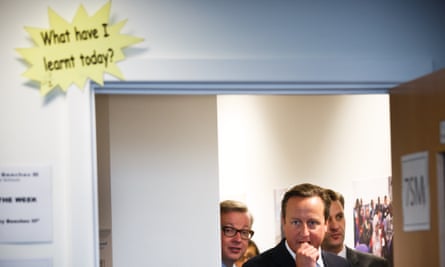
In the immediate aftermath of the scandal, Faraz says he entered a period of reading and reflection. He now describes his homophobic comments as “ignorant” and spends some of his time arguing with Facebook friends who post bigoted remarks. (He showed me these arguments, which he had posted over the course of several months.) During his years in limbo, Faraz has also taught workshops on fatherhood and parenting. “‘Trojan Horse’ plotters dodge teaching ban” was the headline for Gilligan’s article in the Times about these workshops. (This was erroneous – the ban was specifically on teaching in schools, while Faraz was teaching workshops to adults.)
Back in 2014, it was initially suggested that more than 100 teachers and teaching assistants in Birmingham could be banned from schools as a result of the Trojan horse affair. This was soon reduced to 50 – and when misconduct hearings began in 2015, only 15 people faced charges. The misconduct hearings took place in public, in a drab room in the DfE building in Coventry, where legal teams spent months arguing over different forms of Islamic practice.
After the tabloid allegation of radicalisation dissipated, the key accusation against the teachers – whose hearings were grouped according to which school they taught at and their level of seniority – was that they worked together to promote the “undue influence of Islam”. There is no specific definition of “undue influence”, and much of the defence case rested on showing the statutory obligations on schools to include religion. (Alam, not formally an employee of the schools and not subject to the same procedures, was banned by the DfE for life from having anything to do with education, and accused of “undermining fundamental British values”.)
On Tuesday 30 May 2017, a grey morning, the DfE’s professional body, the National College for Teaching and Leadership (NCTL), met to discuss the disciplinary case against the senior leaders connected to the Park View Trust – Razwan Faraz, Lindsey Clark, Hardeep Saini, and Monzoor and Arshad Hussain. The verdict on their lifetime bans from teaching had been delayed for over more than two years, and lawyers for the teachers had filed to have the case thrown out. Faraz didn’t go to Coventry for the hearing; he was expecting another delay and simply couldn’t bear to engage. The only accused to turn up were Lindsey Clark and Arshad Hussain, who broke down in tears before the decision was announced. At around 10.30am, Faraz received a text from his lawyer. “They have dropped the case.”
According to the NCTL disciplinary committee, the repeated failure of the government’s lawyers to share crucial evidence from the Clarke inquiry had “brought the integrity of the process into disrepute.” As a result, the case would have to be thrown out. Lindsey Clark’s lawyer, Katie Langdon, summed up her client’s mixed feelings about this outcome: “Although Ms Clark is pleased that the proceedings are not continuing, today’s victory is a hollow one. She had very much fought for, and sought to obtain, a verdict clearing her of any wrongdoing. This, now, is no longer possible.”
The decision also meant that the hearings against the other teachers in the Park View Trust’s schools (including Mazhar Hussain) would be dropped. After several years and hundreds of thousands of pounds of public money, just one teacher – the former acting head of Oldknow – has had any disciplinary charges upheld in relation to the Trojan horse case. The other 14 have all had their cases overturned, dropped or dismissed.
The verdict doesn’t appear to have changed anyone’s mind about the right and wrongs of the case. “The collapse of the cases doesn’t prove anything one way or another about the plot,” Gilligan told me, citing the fact that it collapsed on a “technicality”.
The DfE is doggedly pursuing the issue; some have speculated that they do not want to lose face, given the scale of the national scandal and the amount of public money already spent. Soon after the cases were thrown out, the DfE opened up a new process: to place some of the former Park View teachers, who are now in theory allowed to return to the classroom, on the Disclosure and Barring Service register. They would not only be banned from classrooms, but would not be allowed to work in any setting involving children. There are limited opportunities to challenge such allegations.
Three years after the Trojan horse letter surfaced, there is still no proof that a conspiracy existed. The central claim that remains about Park View and the other implicated schools is that they had become too Islamic, that some invisible line was crossed from the compulsory level of religion that schools must provide to the point where it was “undue”. But in an education system that is not secular, such as Britain’s, there is no unambiguous way to draw such boundaries.
Among those who believe that a conspiracy existed, as set out in the original dossier, there is a tendency to fall back on vague, dark statements. Several people in Birmingham I spoke to referred to “an ideology, a mindset”, but could not elaborate. “People have hinted darkly to me there were other things going on,” said Felderhof, the educationalist. “That’s interesting isn’t it? My response is always: show me the evidence. I haven’t seen it.”
Main image: Oldknow Academy, now known as Ark Chamberlain Primary Academy. Photograph by Christopher Furlong/Getty
